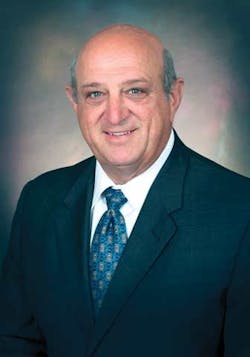Seven years ago, Roy Armes was senior vice president of the Project Management Office at Whirlpool Corp. Based on his 31-year career with the company, you could justifiably classify him as a "lifer."
On Jan. 1, 2007, he was officially named CEO and president of Cooper Tire & Rubber Co., and his whole life changed. He took over a company that had just posted $2.7 billion in sales -- and a $79 million loss. Cooper also lost money in 2005.
Today, the company is financially sound. It posted net income of $220.3 million in 2012, and $56 million for the first quarter ended March 31, 2013. Its stock price is a perennial “Buy,” according to analysts.
Cooper entered the year as the 10th largest tire manufacturer in the world. It should leave the year as part of the seventh largest, following Apollo Tyre Ltd.’s proposed acquisition of Cooper.
Armes, who added chairman to his titles in 2007, and the rest of the board voted unanimously to accept the bid, a 57% premium over the 12-month volume weighted average stock price.
“Price-wise, it was very good for our shareholders,” says Armes. "We also needed to make sure that with the leverage they were going into, this deal could be done with the financing arrangements that Apollo had. We got to a point where we were comfortable with that.
"Third, we needed to find out what the deal would do to our operation, how it would impact our people. We needed to protect that side of it as well. They’ve agreed to retain our facilities and our people because there is very little overlap between the two companies on a global basis.”
In an exclusive interview with Modern Tire Dealer, Armes addresses how the deal will affect Cooper dealers, particularly in the United States.
MTD: You recently were quoted on moderntiredealer.com as saying the sale will benefit your dealers and employees. How will it benefit them?
Armes: When you think about it, we’re bringing a broader product portfolio and brands that would give an extended choice to our customers.
I know a lot of our customers are taking more of a wait-and-see attitude on this, but I’ve talked with enough customers myself to know there’s a lot of interest in how they can really benefit from this with the different brands. They are already asking about off-the-road or farm tires, those products that we don’t have. There also is a different level of TBR tires that will be available to them.
I think some of our customers are getting excited about their opportunities; they just won’t know what they will be until we close the deal and are able to present some opportunities to them from a brand product portfolio standpoint.
MTD: Is there enough capacity at your four North American plants to produce Apollo and/or Vredestein tires and still meet demand for Cooper tires?
Armes: Between our U.S. plants and our Mexico facility, we have capacity to be able to grow and produce more products, yes. We can expand in some of our plants by adding equipment and molds. There are other cases where, depending on the volume, we would have to do some brick and mortar type of expansion, but we don’t anticipate we will need new facilities. I think we can leverage our current footprint without huge capital investments in new facilities.
[PAGEBREAK]
MTD: Apollo is smaller than Cooper. Why didn’t you buy Apollo?
Armes: It was not a priority for us to go in and acquire something in India. We had acquired an operation in Mexico, one in Serbia, and we were expanding in China. Those operations were keeping us pretty well occupied. At the same time, we were looking for further expansion in the emerging markets.
And we didn’t know a lot about the Indian market. We were looking to understand more about that market through our (existing) relationship with Apollo.
MTD: With Cooper in North America, Eastern Europe and China and Apollo in India, Western Europe (with Vredestein) and South Africa, it seems like the companies fit together well.
Armes: Absolutely. We have hardly any overlap geographically. Our brands are positioned differently, so the products and brands have limited overlap. We’re also interested in having better representation in some of the geographies that we aren’t in today.
We will be a bigger player from a scale standpoint, from a leverage standpoint and from a position standpoint. I just see continued growth from here as a result of these two companies coming together.
MTD: When will the acquisition be completed?
Armes: We’re expecting to complete this before year-end. Now, if everything goes well and no significant issues crop up, it’s conceivable that the deal could be done in September or October.
MTD: Do you require regulatory approval from India as well as the United States?
Armes: Yes, and I don’t remember the number of countries that we have to have regulatory approval from -- I think it’s six or seven, and there are different guidelines for what requires approval. We are going through that as we speak today.
MTD: As you know, there were reports out of India back in October that Apollo was going to buy Cooper. Can you please walk me through the timeline of how this all started?
Armes: If I go back several years, we had talked to Apollo about supplying us with some tires as part of an off-take arrangement when we were looking for additional capacity. Then later on, we looked into a possible East European manufacturing joint venture between the two companies. And then later, we looked at distributing our products in South Africa. We were just looking at how we could collaborate as two companies, and take advantage of the... strengths we both offer.
Then last October, this leak came out. We couldn’t comment on rumors and speculation at that point in time, but at the end of the day, we had no deal that was to be discussed. The discussions and the interest of Apollo became much more intense in the last six months or so. We continued to say we were not a company that was out looking to be acquired.
I think Apollo went through their evaluation and saw the value of the company. Then they made a proposal that our board felt was worth taking seriously. And that’s what we did. Ultimately, we ended up with a $35 stock price on the purchase. We also ended up with some committed financing that was part of the discussion,
The $35 was over a 40% premium to the previous day’s stock price. It was a 57% premium over the 12-month volume weighted average price, and it’s a 25% premium over the highest price we’ve seen in over a decade. It’s a very good offer, and a very good value for our company. We had felt for a long time that our stock was undervalued based on the performance of the company over the last few years,
MTD: Was that the first offer Apollo had made to you in that six-month time period?
Armes: No, it wasn’t.
MTD: Is it possible the deal won’t go through?
Armes: There’s always a possibility if you don’t know what you are going to run into. We announced this because we think, with a high degree of certainty, that the deal is going to go through. We think the possibility of it not going through is minimal at this stage.
MTD: What can your dealers expect from Cooper in the short-term?
Armes: I think they can expect what they always have from Cooper: to deliver a great value proposition to them. I don’t think that’s going to change. Then, shortly after we close the deal, I think our salespeople will be prepared to talk about the potential longer-term opportunities that we can present to them.
MTD: Will that include any sort of pricing changes?
Armes: We adjust our pricing with the market, and that’s what we will continue to do. We’ve got to stay competitive for us to deliver a value proposition.
MTD: Does Apollo have a say in how you do business at this point?
Armes: I would say this: Between the announcement and us closing, we will operate as two separate companies because we are competitors. At the same time, integration planning will take place in order to find out where the synergies are, how we will look at our product portfolio, how we will go to market with these new opportunities. We can do some planning during this period of time, but we will still operate as two separate companies.




